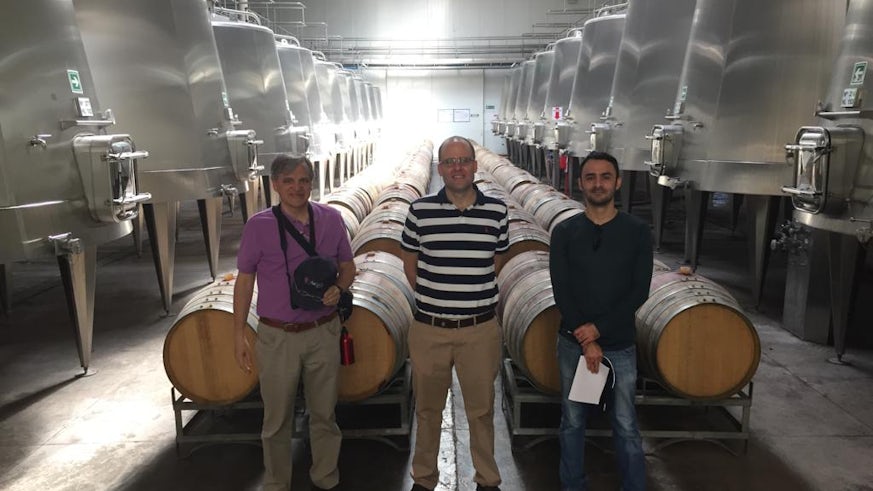Collective growth in Latin America
21 February 2020

Collaborative practice in the Latin American wine industry was the focus of an international visit to Argentina and Chile by Cardiff University academics from the Co-operation for Growth (Co-growth) project.
During the course of their trip, Dr Vasco Sanchez Rodrigues, a Reader in Logistics and Operations Management from Cardiff Business School and the Co-Growth project lead, and Dr Juan Rendon Sanchez, a Research Associate from the School of Computer Sciences and Informatics, presented research findings and best practices in collaboration to industry bodies, vineyards and universities across the Latin American regions.
The aim of the visit was also to gain a greater understanding of the collaboration practices adopted in Chile and Argentina and the measures they are taking towards becoming more sustainable in their supply chains, whilst facing the realities of climate change.
The academics met with faculty from the University of Cuyo (Universidad Nacional de Cuyo, UNCuyo) in Mendoza, the University for Development (Universidad de Desarrollo) and Diego Portales University in Chile to discuss joint research proposals and to understand the research that’s already being done in their wine sectors.
They also met with senior managers from Wines of Chile, the San Pedro and Vina Requingua vineyards of Chile, and Peñaflor Group and Trivento vineyard owned by Concha y Toro Group of Mendoza to hear first-hand the challenges producers and industry bodies are facing and the collaboration that already exists.
Dr Sanchez Rodrigues and Dr Rendon Sanchez explained how the Co-growth project aims to facilitate co-operation within the drinks sector in Wales through the application of cluster-based research, and how learnings from the project could be applied to the wine sectors in Latin America.
“Co-growth is a means of collective growth among businesses,” explained Dr Vasco Sanchez Rodrigues.
Sharing capacity

In Mendoza, Dr Sanchez Rodrigues met with faculty from the Centro de Estudios y Aplicaciones Logísticas (CEAL) in the University of Cuyo to embark on a joint research proposal.
The vision for the joint research is to apply the principles of the Co-Growth project to the local winemaking industry, with the focus on micro-vineyards.
As Dr Sanchez Rodrigues explained during his visit, the ethos can apply to practically any stage of the production chain, including bottling, packaging and transport, among others.
“Not all businesses have the same capacity for production or bottling, so the idea is that they can share capacity,” he said.
“The research focus is this group of small and medium-sized enterprises whose management is unable to deal with certain problems. Larger businesses, however, can cope with such issues, and what’s more on a global scale. It is important to combine the cultural and technological aspects.”
Dr Rendon Sanchez was also able to link his modelling work on the Co-Growth project to work that members from CEAL had published on the modelling of horizontal collaboration in the wine industry. These learnings can also be applied to the modelling of collaboration areas with the Welsh drinks sector.
A virtuous circle
Sustainability was a reoccurring theme when they visited Chile, where the Co-Growth project learnings offer solutions applicable to their winemaking industry, in particular for bottling, product distribution, and even opening new distribution channels for export.
Dr Sanchez Rodrigues sees the project as a means to facilitate collaboration between larger vineyards on standardising sustainability practices, enabling the wines of Chile to be a more sustainable brand.
He has already started early discussions on proposal ideas with Dr Mauricio Varas from the Universidad de Desarrollo and Dr Franco Basso Solt from Universidad Diego Portales in Chile on the standardisation of sustainability practices, which will enable the Wines of Chile to be a more sustainable brand.
“Several opportunities for collaboration were identified during the course of the visit, including bi-lateral collaboration on MSc student’s dissertation supervision and the development of a collaboration model for the Chile wine sector for climate-change adaptation and sustainability purposes.”
A global network
The internationalisation of the Co-Growth project will ensure that global best practices are captured and understood in order to transfer them back to the drinks sector in Wales.

“As an academic, I want to work with the whole of Latin America, and we are also engaging with universities in Chile and Japan. The intention is to establish a global network.”
Share this story
This project is part-funded by the European Agricultural Fund for Rural Development through the Welsh Government.



